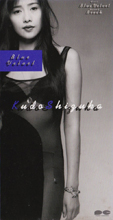
"Blue Velvet" is a song recorded by Japanese singer Shizuka Kudo for her thirteenth studio album, I'm Not. It was released by Pony Canyon as the album's leading single on May 28, 1997. It served as the third ending theme song to the CX anime series Dragon Ball GT, from episode 42 through 50. Out of all the artists that have contributed to the series' soundtracks, Kudo is the only one who is unaffiliated with a Being Inc. label. Kudo, who is a self-proclaimed Dragon Ball fan, received an autographed hand-drawn illustration of Goku from series creator Akira Toriyama for her 28th birthday.
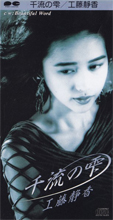
"Senryū no Shizuku" is a song recorded by Japanese singer Shizuka Kudo. It was released as a single through Pony Canyon on May 9, 1990. It marks the debut of Kudo as a songwriter. The song was featured on commercials for Taiyo Yuden That's cassette tapes. Similarly to her previous single, "Kuchibiru Kara Biyaku", a limited number of 7-inch vinyls of the single were produced for promotional use. "Senryū no Shizuku" has never appeared on an original album, but was included in the compilation album Unlimited (1990).

"Blue Rose" is a song recorded by Japanese singer Shizuka Kudo, from her ninth studio album, Expose. It was released through Pony Canyon as the album's lead single on March 18, 1994. The song marks a significant change in artistic direction for Kudo, as it is her first single to be self-produced, as well as her first release since parting ways with long-time collaborator Tsugutoshi Gotō, who has helmed Kudo's songwriting team since her solo debut. It was featured on TV commercials for Seagaia Ocean Dome. The single's B-side, "Door", is the ending theme to the TX television series Tsumiki Kuzushi: Hōkai, Soshite.... Kudo performed "Blue Rose" on the 45th Kōhaku Uta Gassen, marking her seventh consecutive appearance on the show. It is the first in a trilogy of singles with the word "blue" in the title: "Blue Rose" was later followed by "Blue Velvet" and "Blue Zone".

"Ice Rain" is a song recorded by Japanese singer Shizuka Kudo for her tenth studio album, Purple. It was released through Pony Canyon as the album's lead single on November 18, 1994, merely two months following the release of her ninth studio album, Expose. The single was released simultaneously with Kudo's third video album, Female III. An English version of the song was recorded for the compilation album, Best of Ballade: Current (1998). In 2015, DAM asked their users to select their favorite Shizuka Kudo songs to sing karaoke to and compiled a top ten list; "Ice Rain" came in at number three and was the only song penned by Kudo to make the top ten.

"Moon Water" is a song recorded by Japanese singer Shizuka Kudo, from her tenth studio album, Purple. It was released through Pony Canyon as the album's second single on May 19, 1995. When Kudo appeared on the AX tanpatsu drama Ren'ai Zenya: Ichido Dake 2 (1996) as a drawing-class model, the artwork she was the subject of is revealed to be a direct replication of the "Moon Water" cover art.

"Kama Sutra no Densetsu" is a song recorded by Japanese singer Shizuka Kudo for her thirteenth studio album, I'm Not. It was released by Pony Canyon as the album's second and last single on November 19, 1997.
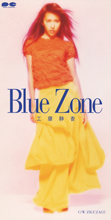
"Blue Zone" is a song recorded by Japanese singer Shizuka Kudo for her fourteenth studio album, Full of Love. It was released through Pony Canyon as the album's lead single on April 7, 1999. The song featured on TV commercials for Toyo tires. A song titled "I.n.g" was originally slated to be released in place of "Blue Zone". Since it does not appear on Full of Love, it is unclear whether the song was scrapped or if "I.n.g" was simply an alternate title. "Blue Zone" is the third and last in a trilogy of singles with "Blue" in the title: "Blue Zone" is preceded by "Blue Velvet" and "Blue Rose", respectively.
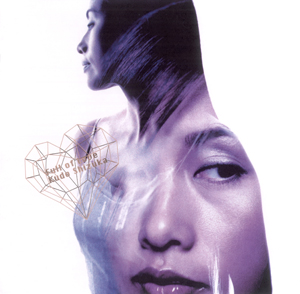
Full of Love is the fourteenth studio album by Japanese singer Shizuka Kudo. It was released on June 2, 1999, through Pony Canyon. The album features a contemporary R&B sound, produced by the likes of Chokkaku, Ichirō Hada and Seishirō Kusunose. It has been described as the perfect driving album for the summer.

20th Anniversary B-side collection is the twelfth compilation album by Japanese singer Shizuka Kudo. It was released in honor of Kudo's 20th anniversary on March 5, 2008, through Pony Canyon.

Millennium Best is the ninth compilation album by Japanese singer Shizuka Kudo. It was released on March 15, 2000, through Pony Canyon. It is Kudo's second single collection: the album features all of Kudo's singles released from "Kindan no Telepathy" (1987) up to her most recent at the time, "Blue Zone" (1999), as well as all five singles released by Ushirogami Hikaretai. The album was released digitally on May 28, 2014, however only the four singles missing from the subsequently released compilation Shizuka Kudo Best were made available for download.
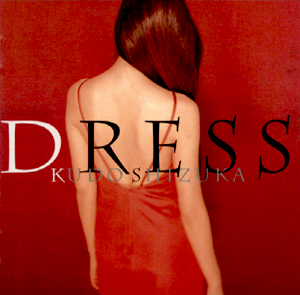
Dress is the twelfth studio album by Japanese singer Shizuka Kudo. It was released on March 19, 1997, through Pony Canyon. The album features a soul and funk-infused rock sound. Musicians Chuei Yoshikawa and Tsuyoshi Kon performed instruments on the album as part of the recording band.

Doing is the eleventh studio album by Japanese singer Shizuka Kudo. It was released on May 17, 1996, through Pony Canyon. The album's title is a nod to Kudo's active lifestyle and busy work schedule at the time of recording the album, which she was "doing" while filming two movies.

Purple is the tenth studio album by Japanese singer Shizuka Kudo. It was released on August 2, 1995, through Pony Canyon. The album is named after Kudo's favorite color, purple, or more specifically wisteria. The record features the song "Olivia", which Kudo wrote about her deceased brother.

She: Best of Best is the seventh compilation album by Japanese singer Shizuka Kudo. It was released on December 16, 1996, through Pony Canyon. The first disc includes songs from Kudo's Tsugutoshi Gotō-produced era albums, while the second disc features songs from Kudo's self-produced records. Disc 2 contains a new song written specifically for the album, entitled "Hot Winter".
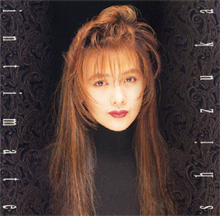
Intimate is the fourth compilation album by Japanese singer Shizuka Kudo. It was released on December 11, 1991, through Pony Canyon. The album features all singles released from "Koi Hitoyo" (1988) through "Metamorphose" (1991). The opening track, "Dare mo Shiranai Blue Angel" is a re-worked solo recording of an Ushirogami Hikaretai song by the same name released as a B-side to the single "Hora ne, Haru ga Kita" in 1988. The closing track is a new song entitled "Rashikunai", written specifically for the album by Kudo herself, under the pseudonym Aeri.

Expose is the ninth studio album by Japanese singer Shizuka Kudo. It was released on September 7, 1994, through Pony Canyon. The album was recorded and mastered in Los Angeles. Expose is Kudo's first self-produced album. It yielded the two singles, "Blue Rose" and "Jaguar Line".

Unlimited is the third compilation album by Japanese singer Shizuka Kudo. It was released on November 14, 1990, through Pony Canyon. The album features all original recordings of the singles released from "Koi Hitoyo" (1988) through "Watashi ni Tsuite" (1990), as well as reworked versions with new vocal takes of Kudo's first batch of singles, from "Kindan no Telepathy" through "Mugon... Iroppoi". The album also includes a new song, entitled "Koi Moyō", co-written by Kudo herself, under the pseudonym Aeri, specifically for the album.

Gradation is the first compilation album by Japanese singer Shizuka Kudo. It was released on November 30, 1988, through Pony Canyon. The album includes all five singles released by Kudo at the time, from "Kindan no Telepathy" through "Mugon... Iroppoi", their coupling songs, as well as one new song, entitled "X'mas ga Ippai", recorded specifically for the compilation. Gradation was re-released in gold CD format on March 21, 1989.

Karelia is the fourth studio album by Japanese singer Shizuka Kudo. It was released on October 4, 1989, through Pony Canyon. It is a concept album inspired by the music from Finnish Karelia. The album was entirely recorded in Finland and features the Helsinki Philharmonic Orchestra as well as a choir group from the University of Helsinki. Despite being composed and produced by Tsugutoshi Gotō, Karelia lacks any trace of the signature rock style of Gotō's other compositions. The record features lyrics penned by Taeko Onuki and also includes the first song written by Kudo herself, under the pseudonym Aeri. While in Finland, Kudo created oil paintings inspired by the people and landscapes, which were incorporated into the design of the album's packaging. Karelia was re-issued in APO-CD format on December 1, 1993.

Shizuka is the second studio album by Japanese singer Shizuka Kudo. It was released on July 21, 1988, through Pony Canyon. The eponymous record is often cited as an EP, despite being officially regarded as her second album. Shizuka is entirely written and composed by Miyuki Nakajima and Tsugutoshi Gotō, respectively. Nakajima recorded a cover of the fifth track, "Hadashi no Lion", for her album Otogibanashi: Fairy Ring (2002). Shizuka was re-issued in gold CD on March 21, 1989, and later in APO-CD format on December 1, 1993.





















